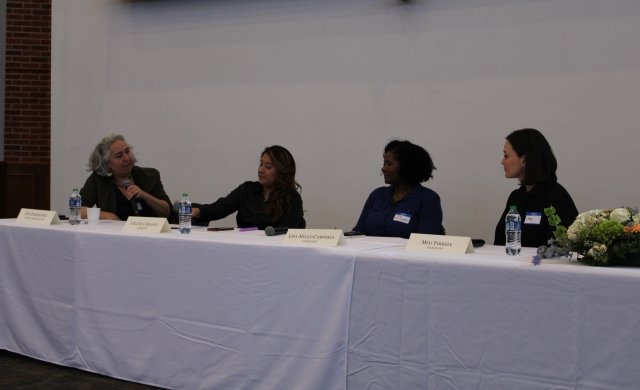Women’s Empowerment Conference Celebrates Feminism and How it Differs Across Generations
Keynote Feminista Jones speaks at Mercy University's eighth Annual Women's Empowerment Conference on March 8, 2024.
On Friday, March 8, 2024, Mercy University celebrated both International Women’s Day and Women’s History Month by hosting its eighth Annual Women’s Empowerment Conference. Called “Looking Back, Moving Forward: Women’s Empowerment Across Generations,” the conference focused on intergenerational feminism and the importance of recognizing that feminism means different things to different generations of women.
The event kicked off with a welcome from Edie Magnus, executive director of media and innovation. Before she introduced the morning’s panel, Magnus reinforced the idea of intergenerational feminism by sharing a quote from Mercy Alumna Meisha Ross Porter, M.S. '03, H.D. '20, president and CEO of the Bronx Community Foundation: “The women who shape our lives are the women we interact with every day.”
The panel, called “Feminist Pathways, an Intergenerational Conversation” was moderated by Dr. Eva Fernández, provost and vice president of academic affairs at Mercy and featured Meg Tirrell, medical correspondent for CNN, Lisa Mills-Campbell ‘98, M.B.A. '01, M.S. '13, director of community programs and events at Mercy and Jailene Carrasco, career counselor and graduate student at Mercy. The panelists gave the audience an intergenerational perspective about the past, present and future of feminism.
Fernández opened the discussion by asking the panel about their support networks and what intergenerational feminism meant to them. “As you look at the different generations you see that my mother’s generation paved the way for me to focus on my career,” said Mills-Campbell. “And my generation paved the way for the generation after me to focus on really bettering themselves and their communities.”
Focusing on the recent attacks on women’s rights, Fernández talked about the fact that lately it can be hard to see if women have made any real progress. She said, “When I was young, I felt that the world was in the palm of my hand. I was such an idealist, and I was entering a world where women had a lot of excellent rights and incredible recognitions.” Fernandez continued, “And I would say that the scales have fallen from my eyes as I have gotten older, and I enter spaces where I see inequities that I didn’t have in my line of sight.”
The conversation pivoted to how women can help and support each other. Carrasco said, “What I’ve come to realize is that you do have to have empathy, and I think, as women, we’re afraid to have that. We’re afraid to be empathetic to others and afraid to share our struggles, and we need to talk about that in our circles.”
Wrapping up the discussion, Fernández asked the panel what they thought about the future and the hopes they have for girls today who will be the women leaders of tomorrow. Tirrell talked about the importance of women supporting women. “There really is room for us all and when you lift somebody else up, you’re lifting yourself up, too. I can make space for another woman and not lessen the space for myself.”

After the panel discussion, when asked for their thoughts, Brianna Cauthen, assistant director of STEP at Mercy said she found it, “More than inspiring.” She continued, “It really resonated with me when they talked about how important their families are to them, and how that’s where they get their strength.” Serena Stevenson, STEP coordinator at Mercy, added, “I really appreciated that the panel was selected to represent three different generations, especially when Lisa talked about her sons being the same age as me. Her responses were something I see in my own mother, so it was good to hear how her experiences shaped her.”
The conference concluded with a keynote speech by educator, feminist writer, public speaker, community activist, and retired social worker Feminista Jones. Jones is also the award-winning author of the critically acclaimed “Reclaiming Our Space: How Black Feminists Are Changing the World from the Tweets to the Streets.”
Before her speech, when asked how her passion for feminism was born, Jones said, “I was fortunate to have access to education that my peers were not getting. That’s when I really started digging into feminist literature and then it became like, ‘What is this? This is awesome!’” Jones continued, “And I realized that it’s not just lyrics from my favorite rap songs — women have been talking about [feminism] for centuries. For as long as men have oppressed women, there have been women who have fought back.”
Jones’s speech highlighted the centuries-long struggle for equality and how an equal and equitable society has proven to be beneficial for everyone. She explained, “When you free women of [the patriarchy], you free the whole society. Paulo Freire talks about how oppressors are oppressed by their oppression. Men suffer because of patriarchy, too. But when you free women and free everyone who is oppressed by them, you free the men, too.”
She touched on the importance reproductive rights have in lifting women and communities out of poverty. Jones said, “We know historically that when you allow women reproductive justice and agency you can reduce poverty. You can elevate them out of poverty. When you’re allowed to say, ‘I have three children. I don’t want any more,’ that helps them.”
Jones emphasized how education plays a key role in our society and in empowering future generations of women and men. She added, “Feminism is inherently intergenerational. There is no liberation work that can be done siloed. There needs to be cross-generational work, if for no other reason than we can be like, ‘We tried this, it didn’t work, or we have this idea—we tried this but here’s how we can tweak it,’ so you’re not reinventing the wheel, you’re trying to sharpen it and make it faster.”
